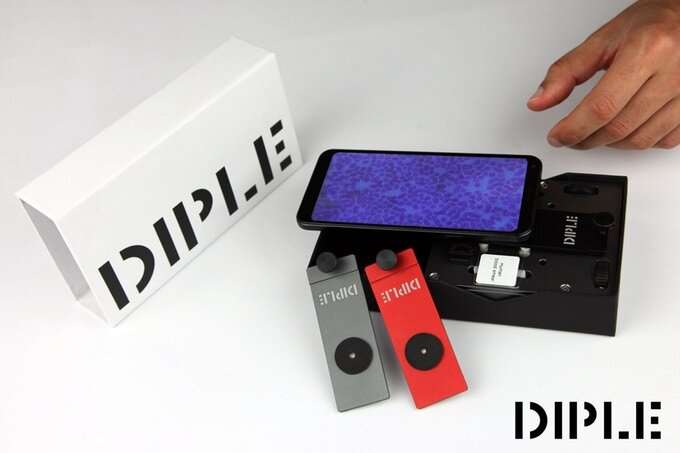November 23, 2019 by Nancy Cohen, Phys.org
Your phone as camera, check, your phone as fitness counter, check, your phone as GPS, check...and now your phone as microscope? Diple is a portable kit that transforms any smartphone into a microscope. Its makers have turned to Kickstarter to help make it real for those who may want an affordable and portable scientific tool.
With Diple, the pitch is straightforward. One can take quality images of the micro-world. See your own blood cells, for example. (The Kickstarter page offers instructions and it involves taking a drop of blood and smearing it on a plain glass slide. The message is please be careful: work in a proper environment and use only sterile lancets.) Actually, the Kickstarter page is generous with instructions for preparing any other types of observations such as bacteria.
Diple is a compact and portable box and it contains a light source, stage for samples/microscope, slides and a metal plate with an optical system. Courtney Linder in Popular Mechanics said the entire apparatus resembles rectangular boxes for new smartphones.
They are offering various versions "for any budget." They note it could be appreciated by those who want to observe microorganisms or cells and also those whose interests are in mineralogy and materials science. Save directly to your phone. DIPLE offers three levels of magnification (35x, 75x, and 150x), which can be increased using the phone's zoom.
The makers of Diple, SmartMicroOptics, say users will be able to achieve up to 1,000x magnification "before getting any pixelation," though that will depend in part on the capacity of individuals' smartphones, said The Verge.
SmartMicroOptics, founded in 2016, is a spinoff of the Italian Institute of Technology. The company made news in the past about their "Blips" lenses and lab kits, which they also turned to Kickstarter for the project, that same year.
Diple Red has a resolution of about 3 micron. One can see cells or the invisible micro organisms around us.
Diple Grey's resolution is around 1 micron. You can see cells and bacteria.
Diple Black is the most powerful lens. Resolution is below 1 micron.
Setup involves just placing the camera on the optical system and use the Diple app to control how you scan across the magnified image. Cal Jeffrey in TechSpot: "Diple is more a portable platform that doesn't really attach to the phone at all. You only need to align the device's objective lens to the Diple's microscope lens to see details at 35x—1000x magnification (dependent on device's digital zoom capabilities and the lens package purchased)."
So, is it, as the promotional video suggests, a convenient alternative to "expensive microscopes?" This is, after all, a budget microscope, but its makers say that "Diple provides an unprecedented quality of image for a budget microscope."
The Kickstarter response indicates that a substantial number of Kickstarter visitors said oh, yes. The amount pledged at the time of this writing was $70,427 against their goal of $27,553. And there were still 25 days left to go.
Two stages involve a simple standard stage where you shift your slides manually. The fine stage is where the slide can be shifted via mechanical screws for a precise search of microscopic targets.
How durable is the system? The team did the drop test—from the third floor of a building and the system was ok.
Arrival dates depending on the package chosen are May and June 2020.
The prices on Kickstarter are varied depending on the package choices but here is just an example of listings and package contents. For about $40, there is the Diple Red, 1 standard stage, 3 prepared slides and 2 plain slides, light source, pipette, tweezers. On the upper range the price listed is about $489 for five of the Diple Black with fine stage packages, suitable for workshops and classes.
More information: diple.smartmicrooptics.com/
www.kickstarter.com/projects/b … e-for-any-smartphone
© 2019 Science X Network


